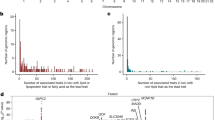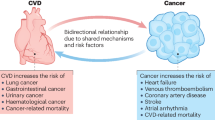Abstract
Objective:
Plasma B-group vitamins and age may affect the carotid intima-media thickness (IMT) in subjects with different 677TT genotype of the methylenetetrahydrofolate reductase (MTHFR) gene.
Design:
A hospital-based cross-study.
Setting:
Genomic and Vascular Center, Changhua Christian Hospital, Changhua, Taiwan.
Subjects:
Five hundred and forty-one clinically healthy subjects.
Intervention:
Fasting plasma, homocysteine (Hcy), vitamin B6, vitamin B12, folate and B-mode carotid ultrasound.
Results:
MTHFR genotype, plasma concentrations of folate, vitamin B6 and vitamin B12 and age were significantly correlated to the plasma Hcy concentration. MTHFR 677TT carriers had higher concentrations of Hcy than did subjects with the CC and CT genotypes. Age, sex, body mass index and plasma Hcy were independent contributors to increase carotid IMT. However, with stratification by mean value of age and B-group vitamins concentrations, we found that at advanced age, lower plasma folate and vitamin B12 were three risk factors involved in the enhancing effect of the MTHFR 677TT genotype on the increase of plasma Hcy and carotid IMT.
Conclusion:
MTHFR 677TT-related carotid atherosclerosis was only identified in healthy elderly subjects with lower level of plasma folate and vitamin B12.
Sponsorship:
Changhua Christian Hospital.
This is a preview of subscription content, access via your institution
Access options
Subscribe to this journal
Receive 12 print issues and online access
$259.00 per year
only $21.58 per issue
Buy this article
- Purchase on Springer Link
- Instant access to full article PDF
Prices may be subject to local taxes which are calculated during checkout




Similar content being viewed by others
References
Bots ML, Hoes AW, Koudstaal PJ, Hofman A, Grobbee DE (1997). Common carotid intima-media thickness and risk of stroke and myocardial infarction. The Rotterdam Study. Circulation 96, 1432–1437.
Boushey CJ, Beresford SA, Omenn GS, Motulsky AG (1995). A quantitative assessment of plasma homocysteine as a risk factor for vascular disease. Probable benefits of increasing folate intakes. J Am Med Assoc 274, 1049–1057.
Burke GL, Evans GW, Riley WA, Sharrett AR, Howard G, Barnes RW et al. (1995). Arterial wall thickness is associated with prevalent cardiovascular disease in middle aged adults. The Atherosclerosis risk in communities (ARIC) study. Stroke 26, 386–391.
Christensen B, Frosst P, Lussier-Cacan S, Selhub J, Goyette P, Rosenblatt DS et al. (1997). Correlation of a common mutation in the methylenetetrahydrofolate reductase gene with plasma homocysteine in patients with premature coronary artery disease. Arterioscler Thromb Vasc Biol 17, 569–573.
de Bree A, Verschuren WM, Bjorke-Monsen AL, van der Put NM, Heil SG, Trijbels FJ et al. (2003). Effect of the methylenetetrahydrofolate reductase 677C → T mutation on the relations among folate intake and plasma folate and homocysteine concentrations in a general population sample. Am J Clin Nutr 77, 687–693.
de Maat MP, Bladbjerg EM, Drivsholm T, Borch-Johnsen K, Moller L, Jespersen J (2003). Inflammation, thrombosis and atherosclerosis: results of the glostrup study. J Thromb Haemost 1, 950–957.
Dudman NPB, Guo XW, Crooks R, Xie L, Silberberg JS (1996). Assay of plasma homocysteine: light sensitivity of the fluorescent 7-benzo-2-oxa-1,3-diazole-4-sulfonic acid derivative, and use of appropriate calibrators. Clin Chem 42, 2028–2032.
Girelli D, Martinelli N, Pizzolo F, Friso S, Olivieri O, Stranieri C et al. (2003). The interaction between MTHFR 677 C → T genotype and folate status is a determinant of coronary atherosclerosis risk. J Nutr 133, 1281–1285.
Hamelahti P, Jarvinen O, Sisto T, Wirta V, Ilveskoski E, Koivula T et al. (2002). Methylenetetrahydrofolate reductase gene C677T mutation is related to the defects in the internal elastic lamina of the artery wall. Eur J Clin Invest 32, 869–873.
Haraki T, Takegoshi T, Kitoh C, Kajinami K, Wakasugi T, Hirai J et al. (2001). Hyperhomocysteinemia, diabetes mellitus, and carotid atherosclerosis independently increase atherosclerotic vascular disease outcome in Japanese patients with end-stage renal disease. Clin Nephrol 56, 132–139.
Inamoto N, Katsuya T, Kokubo Y, Mannami T, Asai T, Baba S et al. (2003). Association of methylenetetrahydrofolate reductase gene polymorphism with carotid atherosclerosis depending on smoking status in a Japanese general population. Stroke 34, 1628–1633.
Kawamoto R, Kohara K, Tabara Y, Miki T, Doi T, Tokunaga H et al. (2001). An association of 5,10-methylenetetrahydrofolate reductase (MTHFR) gene polymorphism and common carotid atherosclerosis. J Hum Genet 46, 506–510.
Lim PS, Hung WR, Wei YH (2001). Polymorphism in methylenetetrahydrofolate reductase gene: its impact on plasma homocysteine levels and carotid atherosclerosis in ESRD patients receiving hemodialysis. Nephron 87, 249–256.
Lin JS, Shen MC, Tsai W, Lin B (2000). The prevalence of C677T mutation in the methylenetetrahydrofolate reductase gene and its association with venous thrombophilia in Taiwanese Chinese. Thromb Res 97, 89–94.
Liu CS, Chiang HC, Kuo CL, Chen HW (2004). Methylenetetrahydrofolate reductase polymorphism determines the plasma homocysteine-lowering effect of high-dose folate supplementation in patients with cardiovascular disease. Nutrition 20, 974–978.
Manolio TA, Boerwinkle E, O'Donnell CJ, Wilson AF (2004). Genetics of ultrasonographic carotid atherosclerosis. Arterioscler Thromb Vasc Biol 24, 1567–1577.
McQuillan BM, Beilby JP, Nidorf M, Thompson PL, Hung J (1999). Hyperhomocysteinemia but not the C677T mutation of methylenetetrahydrofolate reductase is an independent risk determinant of carotid wall thickening. The perth carotid ultrasound disease assessment study (CUDAS). Circulation 99, 2383–2388.
Nakaso K, Yasui K, Kowa H, Kusumi M, Ueda K, Yoshimoto Y et al. (2003). Hypertrophy of IMC of carotid artery in Parkinson's disease is associated with L-DOPA, homocysteine, and MTHFR genotype. J Neurol Sci 207, 19–23.
O'Leary DH, Polak JF, Kronmal RA, Manolio TA, Burke GL, Wolfson Jr SK (1999). Carotid-artery intima media thickness as a risk factor for myocardial infarction and stoke in older adults. N Engl J Med 340, 14–22.
Passaro A, Vanini A, Calzoni F, Alberti L, Zamboni PF, Fellin R et al. (2001). Plasma homocysteine, methylenetetrahydrofolate reductase mutation and carotid damage in elderly healthy women. Atherosclerosis 157, 175–180.
Ravera M, Viazzi F, Berruti V, Leoncini G, Zagami P, Bezante GP et al. (2001). 5,10-Methylenetetrahydrofolate reductase polymorphism and early organ damage in primary hypertension. Am J Hypertens 14, 371–376.
Rockett HR, Breitenbach M, Frazier AL, Witschi J, Wolf AM, Field AE et al. (1997). Validation of a youth/adolescent food frequency questionnaire. Prev Med 26, 808–816.
Salonen JT, Salonen R (1993). Ultrasound B-mode imaging in observational studies of atherosclerotic progression. Circulation 87, II56–II65.
Saw SM, Yuan JM, Ong CN, Arakawa K, Lee HP, Coetzee GA et al. (2001). Genetic, dietary, and other lifestyle determinants of plasma homocysteine concentrations in middle-aged and older Chinese men and women in Singapore. Am J Clin Nutr 73, 232–239.
Scaglione L, Gambino R, Rolfo E, Lillaz E, Gai M, Cassader M et al. (2002). Plasma homocysteine, methylenetetrahydrofolate reductase gene polymorphism and carotid intima-media thickness in Italian type 2 diabetic patients. Eur J Clin Invest 32, 24–28.
Schmitz C, Lindpaintner K, Verhoef P, Gaziano JM, Buring J (1996). Genetic polymorphism of methylenetetrahydrofolate reductase and myocardial infarction. A case–control study. Circulation 94, 1812–1814.
Schwammenthal Y, Tanne D (2004). Homocysteine, B-vitamin supplementation, and stroke prevention: from observational to interventional trials. Lancet Neurol 3, 493–495.
Selhub J, Jacques PF, Bostom AG, D'Agostino RB, Wilson PW, Belanger AJ et al. (1995). Association between plasma homocysteine concentrations and extracranial carotid-artery stenosis. N Engl J Med 332, 286–291.
Spence JD, Malinow MR, Barnett PA, Marian AJ, Freeman D, Hegele RA (1996). Plasma homocyst(e)ine concentration, but not MTHFR genotype, is associated with variation in carotid plaque area. Stroke 30, 969–973.
Zuliani G, Volpato S, Mecocci P, Cherubini A (2000). The A677V MTHFR allele is not associated with carotid atherosclerosis in octogenarians. Stroke 31, 990–991.
Zuntar I, Topic E, Vukosavic D, Vukovic V, Demarin V, Begonja A et al. (2003). Croatian population data for the C677T polymorphism in methylenetetrahydrofolate reductase: frequencies in healthy and atherosclerotic study groups. Clin Chim Acta 335, 95–100.
Acknowledgements
This work was supported by research Grant NSC92-2314-B-371-004 from the National Science Council, Changhua christian Hospital and Institute of Biomedical Sciences, Academica Sinica, Taiwan.
Author information
Authors and Affiliations
Corresponding author
Rights and permissions
About this article
Cite this article
Liu, C., Chen, C., Chiang, H. et al. B-group vitamins, MTHFR C677T polymorphism and carotid intima-media thickness in clinically healthy subjects. Eur J Clin Nutr 61, 996–1003 (2007). https://doi.org/10.1038/sj.ejcn.1602606
Received:
Revised:
Accepted:
Published:
Issue Date:
DOI: https://doi.org/10.1038/sj.ejcn.1602606
Keywords
This article is cited by
-
Associations between homocysteine metabolism related SNPs and carotid intima-media thickness: a Chinese sib pair study
Journal of Thrombosis and Thrombolysis (2017)



